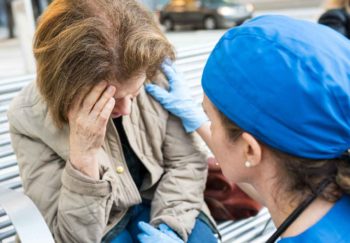Brain aneurysms are the silent killer you don't see coming. Most don’t cause symptoms until it’s too late.
A brain aneurysm is a weak spot in a blood vessel in your brain. Like water through a gardening hose, blood keeps flowing through your blood vessel like normal until that weak spot breaks and bursts open (ruptures). That causes a bleeding stroke (subarachnoid hemorrhage).
When you hear “stroke,” you likely think of the most common type, called ischemic stroke. Bleeding strokes caused by ruptured brain aneurysms are even more deadly. One-fourth of people with a ruptured brain aneurysm die within 24 hours. Another 25% die within 3 months. And 66% of people who live beyond then suffer permanent brain damage.
So what can you do about this deadly threat that you can’t see or feel? Brain aneurysms run in families, meaning they’re hereditary. Knowing your risk can save your life. If you can find out you have a brain aneurysm before it bursts, doctors can watch and treat it.
Why a Family Medical History Matters
Many people find out they have a brain aneurysm by accident. They get imaging for another medical issue, and the brain aneurysm shows up on the scan. But a recent review of dozens of research studies found 5-20% of patients with a brain aneurysm have a family member with one.
Matthew Thomas, ScM, CGC, a UVA Health genetic counselor, helps people understand their risk. We asked him who should think about screening or genetic counseling for brain aneurysms.
Should I Be Screened for Brain Aneurysms?
Worried About Brain Aneurysms?
See a UVA Health specialist and find out if screening or genetic counseling for hereditary brain aneurysms can help you.
If you have 2 or more blood relatives who have or had a brain aneurysm, Thomas recommends asking your doctor about a hereditary brain aneurysm screening. This advice is backed by American Heart Association/American Stroke Association guidelines.
Remember, someone who had a bleeding (hemorrhagic) stroke may have had a brain aneurysm. So, make sure to find out what type of stroke a family member had.
At UVA Health, we use magnetic resonance angiography or computed tomography angiogram to screen for brain aneurysms.
Do I Need Genetic Counseling for Brain Aneurysms?
Seeing a genetic counselor helps you learn about your own or other family members’ risk for a medical condition. They help you understand what your personal and family medical history could mean. If genetic testing could help you learn more, a counselor will explain how that works and what you might find out.
Why get genetic counseling for brain aneurysms? "Genetic testing may help a patient know if they're at risk for other aneurysms that affect their brain and other parts of their body. It can also help know if other family members are at risk for the same problem," Thomas says.
Thomas recommends genetic counseling if you have a brain aneurysm and 1 of these:
- Aneurysm in another body part, like an aortic aneurysm
- Signs or diagnosis of certain syndromes, like vascular Ehlers-Danlos or Loeys-Deitz
- Multiple cysts in your kidneys (polycystic kidney disease)
- Family history of any of the above
At UVA Health, your neurologist or neurosurgeon can refer you to Thomas.
What Happens When I See a Genetic Counselor for Brain Aneurysms?
When Thomas sees a patient about their risk for brain aneurysms, he usually begins by asking a single question: "I want to know what they are hoping and expecting from our visit to make sure I understand what would be most helpful for them.”
Next, he:
- Makes sure what he learned from your medical record is correct
- Talks about your family history to find out if anyone had an aneurysm, stroke, or major vascular problem
If you’re healthy but have a strong family history, medical records from your family members who had a brain aneurysm helps.
“Medical records often confirm what the patient was told by their relative, but sometimes we learn that there was a different vascular (blood vessel) problem. For example, some patients may have a different vascular disease in their brain like an arteriovenous malformation, so they may need to be evaluated for a separate group of genetic conditions,” Thomas explains.
Based on those answers, he may recommend you see a geneticist or other doctor to see if you have a syndrome that can cause aneurysms.
Finally, he explains genetic testing and helps you decide if it’s right for you. “Sometimes genetic testing isn’t recommended or desired by a patient," Thomas says. At that point, he moves the question to whether other family members need screening.
Why Aneurysms Cluster in Families
There’s still a lot to learn about hereditary brain aneurysms. For example, we don’t know which gene or genes cause brain aneurysms.
“For us to be able to offer more helpful genetic testing to patients and their families, we need more research on why aneurysms cluster in some families and not others,” Thomas notes. “At UVA Health, two of our neurologists, Brad Worrall, MD, and Andy Southerland, MD, lead efforts to find and understand genes linked with aneurysm and stroke and participate in multinational research initiatives such as the International Stroke Genetics Consortium.”


